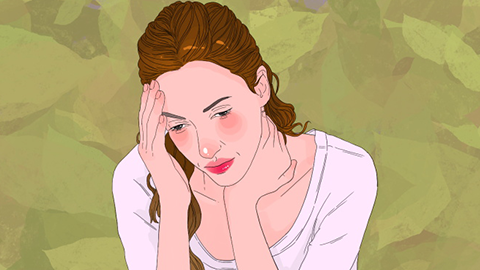What causes headaches at 11 weeks of pregnancy?
Headaches at 11 weeks of pregnancy may be caused by hormonal changes, lack of sleep, gestational hypertension, upper respiratory tract infections, or migraines. Symptoms can be improved through adjusting sleep schedules, relaxing the mind and body, or medication. If headaches are severe or accompanied by blurred vision or vomiting, prompt medical attention is necessary.
1. Hormonal changes: During pregnancy, significant fluctuations in estrogen and progesterone levels can affect blood vessel constriction and dilation, leading to headaches, often presenting as intermittent dull pain. It is recommended to maintain emotional stability, avoid stress and anxiety, and relieve discomfort by listening to soothing music or taking moderate walks.
2. Sleep deprivation: Physical discomfort and mental stress during pregnancy can reduce sleep quality, preventing the brain from adequate rest and triggering headaches. It is advised to maintain a regular sleep schedule, ensure 7–8 hours of sleep each night, avoid electronic screens before bedtime, and create a quiet sleeping environment.

3. Gestational hypertension: Abnormally elevated blood pressure during pregnancy can impair cerebral blood flow and oxygen supply, causing headaches along with dizziness and leg edema. Under medical guidance, medications such as labetalol tablets, nifedipine sustained-release tablets, or methyldopa tablets may be used to relieve symptoms.
4. Upper respiratory tract infection: Reduced immunity during pregnancy makes women more susceptible to viral or bacterial infections such as the common cold, with inflammation contributing to headaches accompanied by nasal congestion and sore throat. Under medical supervision, patients may use medications like感冒Qingre Granules, Pudilan Anti-inflammatory Oral Liquid, or acetaminophen suspension to alleviate symptoms.
5. Migraine: Increased nervous system sensitivity during pregnancy may lead to migraines triggered by noise, bright light, or other stimuli, typically manifesting as pulsating pain on one side of the head. As directed by a physician, medications such as acetaminophen tablets, vitamin B6 tablets, or magnesium supplements may help improve symptoms.
Maintain good indoor ventilation, avoid exposure to irritating odors, follow a light and balanced diet, consume plenty of fresh fruits and vegetables for nutritional support, engage in moderate gentle exercise, and closely monitor changes in physical condition.




